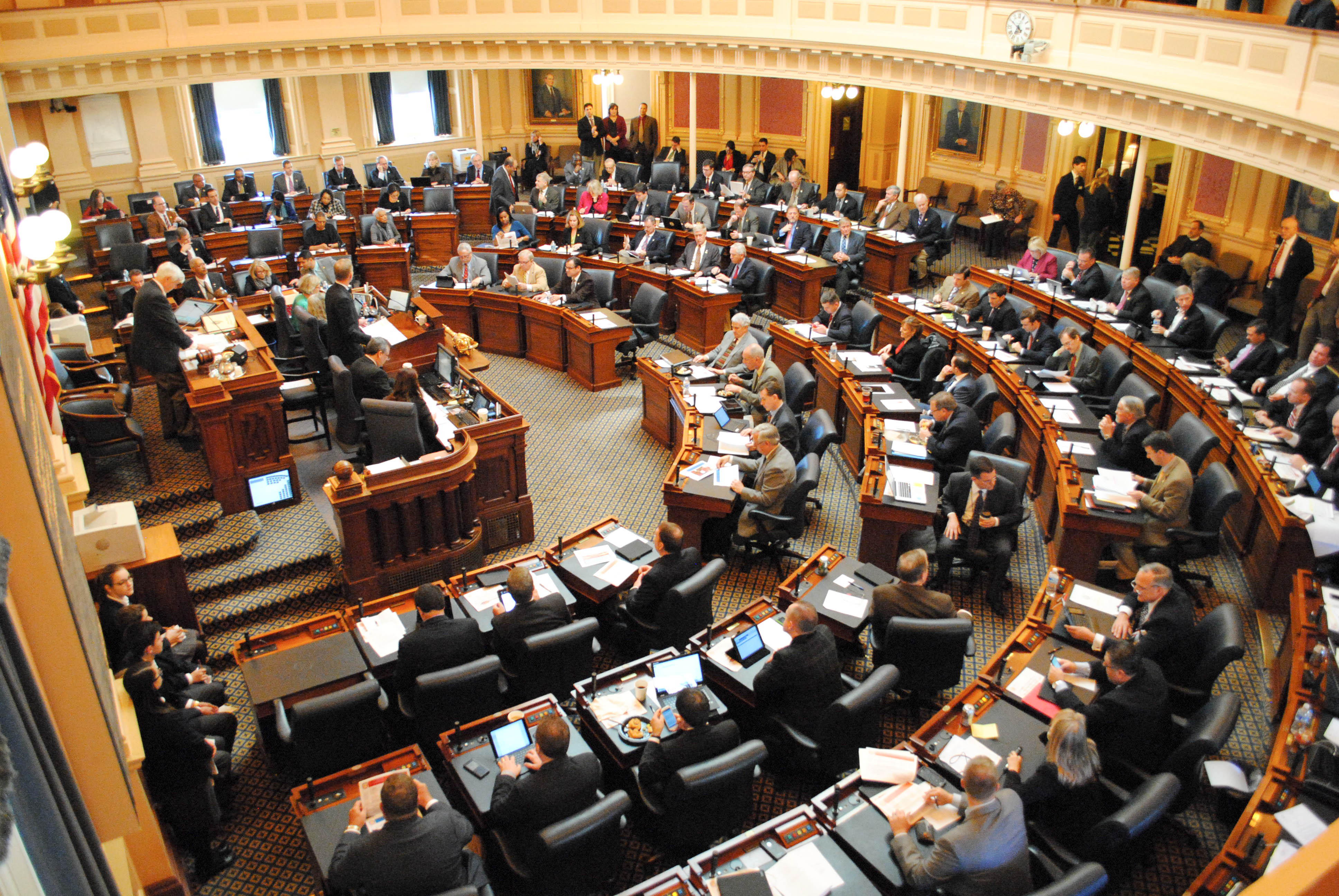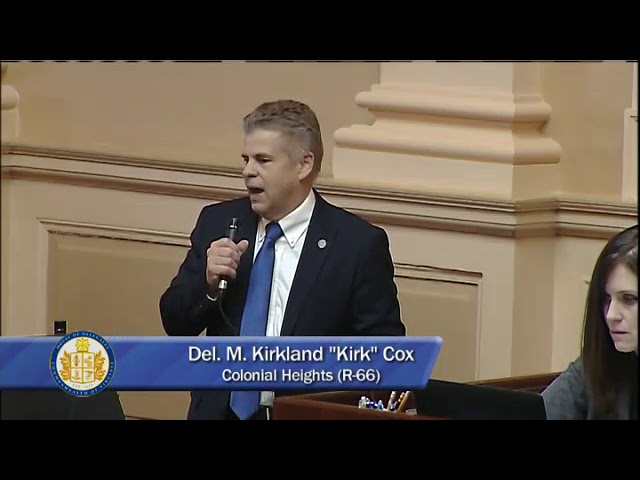Thousands of Virginians are about to descend on Richmond next week in defense of the preborn and in reaction to open Democratic support for infanticide.

Virginia's Public Square
Virginia's Public Square

Thousands of Virginians are about to descend on Richmond next week in defense of the preborn and in reaction to open Democratic support for infanticide.

“I think what my Democratic colleagues are most concerned about is what this moment actually revealed. It was a moment of unbridled honesty about their agenda, and their legislation, and what it actually does,” said Republican House Majority Leader Todd Gilbert.

“This is going to lift up the whole pro-life movement like maybe it’s never been lifted up before,” said President Donald Trump when responding to the highly controversial abortion bill in Virginia, and Governor Ralph Northam’s subsequent remarks.

In a rare and highly-emotional point of personal privilege, Speaker of the Virginia House of Delegates Kirk Cox (R-Colonial Heights) stepped off the dais Wednesday afternoon to remark on one of the most shocking pieces of legislation to be considered by the General Assembly in recent memory.
On Tuesday, a Democratic legislator in the Virginia House of Delegates spoke about a bill she introduced in the 2019 General Assembly session that would lead the Commonwealth towards the ways of New York in repealing restrictions on abortion, including terminations up until the moment of birth.
H.B. 2491, patroned by Delegate Kathy Tran (D-Springfield), would repeal restrictions on third trimester abortions, allowing abortion doctors to self-certify the necessity of late term procedures, eliminate informed consent requirements, repeal abortion clinic health and safety standards, permit late term abortions to be performed in outpatient clinics, remove ultrasound requirements, and eliminate Virginia’s 24-hour waiting period.
Although the legislation was not expected to pass during this year’s session, it represents a progressive policy vision embraced by the leaders of Virginia’s Democratic Party, including Governor Ralph Northam, Lieutenant Governor Justin Fairfax, and Attorney General Mark Herring.
“I have been here almost 30 years,” Speaker Cox said, who relayed that he would be “delivering this speech from the same place I started…desk number 79.”
“A lot of you know I’m not the most spontaneous person in the world, and I’m not the most impulsive. I fully understand that this office comes with tremendous power. I fully understand that you must use that power wisely.”
“I know what I’m doing today. I know it’s a very big deal. This speech is about the number 61,012,997,” he said.
“That is, believe it or not, 50 times larger than all the men and women that have been lost to war in this country.”
“I gave a similar speech in 1996 when that number was 20 million. I gave another speech in 2000 and that number was 40 million. The last time I gave a speech in 2014, I know the number well. it was 54,600,549,” Speaker Cox relayed. “It is the number of abortions since 1973.”
“That number absolutely crushes me. That number absolutely overwhelms me. That number keeps me up at night,” he said, conveying great emotion.
Referencing Psalm 139, the speaker said, “You made all the delegator parts of my body. You knit me together in my mother’s womb. Thank you for making me so wonderfully complex. Your workmanship is marvelous. How well I know it. You watched me as I was being formed in utter seclusion as I was woven together in the dark of the womb. You saw me before I was born. Everyday of my life was recorded in your book. Every moment was laid out before a single day has passed.”
Referencing Hebrews 3:4, he added, “For every house has a builder, but the one that built everything is God.”
“Do you realize we’re made in the image of God?” Cox asked the House.
“One of [the] most astounding things, when I think about it, is the eye, because it’s the window on the whole world,” he said.
Continuing his floor speech, Cox added, “Your retina has 130 million rod-shaped cells, they detect light intensity…they transmit impulses to the brain by means of one million neuro-fibers. Those numbers are almost silly. How on Earth can a creator do that?”
“Nearby,” he added, “six million cone-shaped cells pick out color variation, and the one that amazes me the most, the eye can handle 500,000 messages, simultaneously.”
“We are no accident,” the speaker told the 99 other members of the House of Delegates.
“How about a baby?” he asked.
The speaker continued on, “Week four: The two optic nerves are forming the lens. Week eight: That retina I just began to talk about is forming. Week 16: The eye picks up light. Week 26: The end of the second trimester, that eye is fully formed and the eyelids open. And I think if you shine a flashlight on a mother’s stomach, you might just get a kick or a wiggle.”
“With the miracle of modern medicine, at 22 weeks, we [babies] now have a 20 percent survival rate,” he said. “What a blessing. Modern medicine…what would that be in five years, in 10 years, in 15 years, in 20 years?”
“On January the 22nd…I read the following headline – New York Passes Bill Expanding Abortion Access.”
“My heart just sank,” he remarked.
The bill allows women to seek abortions after a fetus is 24 weeks old if the mother’s life or health is threatened by the pregnancy, also making it legal for women to have an abortion at any time if the fetus is not viable. Moreover, abortion is moved to be regulated under public health law, rather than criminal law, and allows licensed nurse practitioners, physician assistants, and licensed midwives to conduct abortions.
New York Governor Andrew Cuomo (D) hailed the passage of the legislation as a “giant step forward.”
Following the development, the spire atop New York’s Freedom Tower, standing 1,776 feet above the ground, was lit bright pink in solidarity with the activists and lawmakers who helped push the monumental change.
“The freedom tower has two pools that mark 9/11,” Cox explained. “Around each is name of every person who was killed that day. Beside the names of 11 women, a carved stone says ‘and your unborn child.'”
The speaker then told a story about a woman he knows, named Monique, who works at the Capitol building. In 1995, her mother was expecting a third child when a doctor told her that the child would possibly be born with Down Syndrome, due to tests that were run.
“The doctor strongly suggested that she get an abortion,” Cox said about the woman’s mother, who then gave birth the girl, Monique.
The speaker explained that Monique said her mother had “powerful personal belief in life, and that was out of the question.”
“She chose to part ways with her doctor,” he said, “and to make a long story short, there were errors in the testing, false positives.”
“Monique, today, is a recently-graduated young woman of Mary Baldwin University working here at the Capitol, she is marrying her high school sweetheart in July, she’s headed to law school in the fall, she is grateful she told me that her parent’s convictions led them to choose life,” the speaker explained.
Monique was sitting in the House Gallery just one story above the lawmakers Wednesday afternoon. When Cox pointed her out, she received a standing ovation from most, but not all, of the delegates in quorum. Some Democrats chose to remain seated.
“I wish Governor Cuomo could hear Monique’s story,” Speaker Cox charged. “A lot of us think what happened in New York, is New York. So what does this have to do with Virginia?”
“Headline,” Cox continued, “January 27th – Northam Vows To Implement New York Version Of Abortion Law.”
Reading the first paragraph of the article, Cox recited, “Virginia Democratic leaders backed legislation repealing restrictions on third trimester late term abortions, repealing clinic health and safety standards, and eliminating informed consent requirements, among other provisions. They noted the measures were unlikely to pass in 2019, but Governor Northam vowed,” “words have meaning,” he added, “if Democrats take the Virginia House and Senate in November’s elections.
“Here’s what that means,” he set to explain, “this bill will allow a mother showing physical signs of labor to get an abortion.”
“We are really one small step from New York,” the speaker added.
“Did anyone in New York give a speech? Did anyone sound the alarm? Did anyone get out of their comfort zone to stop this? Where have I been since 2014? How did I ever let five years slip away without really doing anything?” Cox proclaimed.
“Here’s how…I made speeches numerous times, and I thought to myself ‘I’ve done my part.’ Every time I do that speech it’s controversial, it makes people extremely unconformable, they’re squirming, they’re staring at the floor, ‘let someone else do it,'” he said. “After all, especially now, ‘you’re the speaker, you’re an important guy, this is a really sensitive topic.””
“You know, those are excuses,” he said. “Those are weaknesses, and I feel ashamed.
“So let’s go full circle,” Speaker Cox continued, “It’s good I’m here in this seat today, seat number 79. I vowed in 1990 to do everything I could to save the unborn and protect life. Frankly, my record has been spotty at best. This speech only begins the true fulfillment of that promise to myself. Promise – reflect on that word. Words have meaning.”
“It reflects not only my commitment to myself, it also reflects the quality of potential – what could be,” he added.
“There are 61,012,997 unkept promises. There are 61,012,997 Moniques who never got to marry their high school sweetheart, never went to college, never went to law school, never go to work at Thomas Jefferson’s capital,” he said.”
“So what is my promise?” Cox posited.
“I will never stop fighting for the promise of life as long as I hold a gavel, as long as I can speak into this microphone, as long as I have the privilege of this floor. I promise to fight for the promise of life.”

“You would not be out of line by saying that it’s potentially genocide…it’s kind of sick,” said radio host John Fredericks about the Democrat-sponsored bill to allow abortions up until the moment of birth in Virginia.

Virginia could soon be joining New York in repealing restrictions on abortion, including terminations up until the moment of birth, under the provisions of a bill backed by Governor Ralph Northam and a substantial number of Democratic lawmakers.
The Repeal Act, introduced as HB2491 by Delegate Kathy Tran (D-Springfield), would repeal restrictions on third trimester abortions, allow abortion doctors to self-certify the necessity of late term procedures, eliminate informed consent requirements, repeal abortion clinic health and safety standards, permit late term abortions to be performed in outpatient clinics, remove ultrasound requirements, and eliminate Virginia’s 24 hour waiting period.
Tran’s Repeal Act received its first subcommittee hearing on Monday, in which the legislation’s sponsor confirmed that the bill would apply to controversial late term procedures, similar to the legislation signed recently by New York Governor Andrew Cuomo.
Under questioning from a House subcommittee, Tran said third trimester abortions would face substantially fewer restrictions.
“How late in the third trimester could a physician perform an abortion if he indicated it would impair the mental health of the woman,” asked subcommittee chairman Todd Gilbert (R-Shenandoah).
“Through the third trimester,” responded Tran. “The third trimester goes all the way up to forty weeks.”
Tran also clarified that abortion procedures would be allowed up until the end of a woman’s pregnancy.
“I don’t think we have a limit in the bill,” added Tran.
In response to a question from Gilbert, Tran also suggested that partial birth abortions would be subject to the bill’s repeal of existing restrictions on the procedure.
“Where it’s obvious that a woman is about to give birth, that she has physical signs that she is about to give birth, would that still be a point at which she could request an abortion if she was so certified?” Gilbert asked.
“She’s dilating,” he continued. “I’m asking if your bill allows that.”
Tran responded that it would.
“My bill would allow that, yes,” she affirmed.
Upon further questioning, Tran explicitly addressed the hypothetical case of aborting a healthy infant, one week before the mother’s due date, on grounds of mental health.
“I certainly could have said a week from her due date and that would have been the same answer, correct?” continued Gilbert.
“That it’s allowed in the bill? Yes,” responded Tran.
Also at issue was the bill’s proposal to change the standard under which third trimester abortions may be performed in Virginia.
Under current law, third trimester abortions require the certification of two independent doctors, who each must verify that the continuation of the pregnancy would “substantially and irremediably impair the mental or physical health of the woman.”
Tran’s bill would substantially relax that standard, removing the words “substantially and irremediably,” allowing the doctor performing the abortion to self-certify the procedure which he or she will perform, without a second opinion, even in cases where a healthy infant could be delivered without risk of physical harm to the woman.
Upon questioning from the committee, Tran confirmed that was the intent of her bill.
“You do acknowledge that you substantially change the standard, by removing a couple words here, correct?” asked Gilbert. “Line eighty, you are changing the standard under which the judgement call is made.”
“Yes, I’m aware,” responded Tran. “I’m changing the standard, yes.”
As the hearing continued, committee members asked the bill’s sponsor to clarify which mental health conditions could be used to justify abortions until the moment of birth.
Tran was unable to provide a response.
“What type of mental health conditions would you anticipate would be utilized by physicians under these circumstances to determine that a child that is otherwise viable is worthy of an abortion?” asked Gilbert, as the questioning continued.
Hesitating, Tran declined to cite a condition, saying she was not a physician, but did clarify that no special mental health training would be required for doctors making such certifications.
The mental health issue was highlighted as a potential loophole allowing late term abortion on demand by Victoria Cobb, president of the Family Foundation, a Virginia group which advocates for socially conservative policy positions.
“The most egregious part of this bill is that it would vastly widen the narrow rationale where our law allows a third trimester abortion, by no longer requiring that a woman’s physical or mental health be ‘substantially and irremediably impaired’ by the concurrence of three doctors.”
“This bill creates abortion, virtually on demand, up until the point of birth.”
The committee also inquired which conditions might require that a third trimester abortion be performed upon an otherwise healthy and deliverable infant in order to protect the physical health of the mother.
“Is there any commonly accepted medical decision to terminate the pregnancy in the late term, rather than deliver the child, if the mother’s health or life is actually in danger?” asked Gilbert.
Tran did not cite any examples before turning the microphone over to a lobbyist from NARAL Pro-Choice Virginia, who was also unable to cite a case with specificity, responding only that she believed such an example happened in Ireland.
Chairman Gilbert was less than impressed with the lack of medical answers.
“Well we’re talking about a lot of physician stuff here and nobody appears to know the answer, and the doctors aren’t here, so it would have been helpful, maybe, to have those questions answered,” Gilbert said in closing.
Following the hearing, the subcommittee voted on party lines to recommend that the bill be laid on the table, though that decision is not binding on the full committee.
While the bill is not expected to pass this year, it represents a policy vision embraced by top Democrats, including Governor Ralph Northam, Lt. Governor Justin Fairfax, Attorney General Mark Herring, and a host of lawmakers, should Democrats succeed in winning legislative majorities in this fall’s elections.
Democrats have said this bill would be a priority if they should take the majority.
Currently, Republicans control the House of Delegates and the Senate of Virginia by razor-thin margins of 51-49 and 21-19, respectively.
“So when can’t change peoples minds, we need to change seats,” said Governor Northam, speaking to the upcoming November elections at a press conference earlier in January.
Watch highlights from the committee hearing below, in longer form than the summary above.

When Republicans announced that gun control legislation from Democrats was “dead on arrival” in the 2019 General Assembly session, they were serious, very serious.

Fourteen gun control bills were defeated by Virginia House Republicans, leaving four remaining. While gun rights supporters said Governor Northam’s agenda appeared dead for the year, they warned these bills represented a wishlist by gun control proponents which could pass if Republicans lose the House and Senate this November.

On Thursday in Richmond, Democratic leaders announced their support for a sweeping repeal of abortion restrictions in Virginia, including deregulation of third trimester late term abortions up until the moment of birth. The press conference, attended by Governor Ralph Northam, Lieutenant Governor Justin Fairfax, Attorney General Mark Herring, and a host of Democratic lawmakers, touted two pieces of legislation filed by Democratic lawmakers, the Repeal Act and the Reproductive Freedom Act.
The Repeal Act, introduced as HB2491 by Delegate Kathy Tran (D-Springfield), would repeal restrictions on third trimester abortions, allow abortionists to self-certify the necessity of the procedures, eliminate informed consent requirements, repeal health and safety standards for abortion clinics, allow late term abortions to be performed in outpatient clinics, waive ultrasound requirements, and eliminate the 24 hour waiting period for abortions in Virginia, among other provisions.
“I introduced House bill 2491, the repeal law, to lift medically unnecessary and unduly burdensome requirements for women to access abortions in the Commonwealth,” said Tran.
“This bill removes hospital requirements on clinics and providers, laws that mandate informed consent, a combination of mandatory ultrasounds, biased literature, and the 24 hour waiting period, and additional doctor requirements for late term abortions,” Tran continued, describing the provisions of the bill.
Third trimester abortions remain highly unpopular with voters, with just 13% saying the procedure should “generally be legal”, according to nonpartisan polling conducted by Gallup, which noted that trimesters were “still key to U.S. abortion views.”
The Reproductive Freedom Act, introduced by Delegate Charniele Herring (D-Alexandria) as HB2369 in the House, and by Jennifer Boysko (D-Herndon) as SB1637 in the Senate, would establish a “fundamental right” to abortion in the Code of Virginia, prohibiting the Commonwealth from enacting restrictions on abortions, including late term procedures in the third trimester of pregnancy. The measure was backed by Governor Northam during his annual State of the Commonwealth address, in which the governor also called for higher spending, sweeping gun control, and a repeal of Virginia’s law requiring voters show photo ID at the polls.
The Democratic leaders were joined by Amy Hagstrom Miller, President and CEO of Whole Woman’s Health, a chain of abortion clinics currently operating in six states, including one location in Charlottesville, Virginia. Miller’s abortion business was the lead plaintiff in the Supreme Court case Whole Woman’s Health v. Hellerstedt, which overturned certain restrictions applicable to abortion clinics.
“We provide fabulous abortion care and we fight the draconian abortion regulations and restrictions,” said Miller. “As abortion providers, we believe that everybody deserves dignity, deserves respect, and that our patients should be at the center of their own health care decisions.”
“That’s why we fight harmful anti-abortion laws, and that’s why we support legislation like this,” continued Miller, saying that passage of the Repeal Act was the “first step” in the fight to expand abortion in Virginia.
An hour before the press conference, lawmakers defeated the Senate’s version of the Repeal Act in the Committee on Education and Health, introduced by Senator Jennifer McClellan (D-Richmond), on a party line vote, with seven Democrats in support and eight Republicans in opposition.
“So, we continue to fight, and we will be back next year to make sure that the Repeal Act passes,” said McClellan.
At the same committee hearing, Boysko’s Reproductive Freedom Act was also defeated on a party line vote.
Boysko, a former board member of NARAL Pro-Choice Virginia and staunch abortion advocate, said she was disappointed by the failure of her bill.
Following the defeat of the Senate bills, and foreshadowing the likely defeat of the measures in the House this year, Northam, Fairfax, and Herring said it was necessary to elect Democratic majorities in November to repeal restrictions on abortion next session.
“So when can’t change peoples minds, we need to change seats,” said Governor Northam, speaking to the upcoming November elections.
Northam, who is a doctor, worked as a pediatric neurologist prior to being elected governor.
Lieutenant Governor Justin Fairfax, a strong supporter of abortion, echoed the governor’s electoral sentiments.
“Though we had some setbacks today in committee around this legislation, please be on notice that when we come back for our next General Assembly session, it will be a very different outcome, because we will have more allies in the House and the Senate,” added Fairfax, who formerly served as a board member of the Planned Parenthood Metropolitan Washington Action Fund.
“I will continue to bang that gavel for progress,” said Fairfax.
Vowing to be a “brick wall” against restrictions on abortion, Attorney General Mark Herring also called on Virginians to elect a pro-choice Democratic majority, while also noting his work as Attorney General fighting against a twenty-week abortion ban and working to protect funding for Planned Parenthood.
“In 2017, Virginia elected three pro-choice, statewide, state elected officials, fifteen new pro-choice delegates, and this past election, elected three pro-choice congresswomen,” added Herring.
“We need a pro-choice majority in the General Assembly,” Herring continued.
During the 2016-2017 statewide campaign cycle, abortion advocates contributed heavily to Democratic campaigns in hopes of repealing abortion restrictions, donating a combined total of $4,871,584 directly and in-kind to pro-abortion politicians, according to campaign finance reports compiled by VPAP.
While that investment helped elect Democrats to the offices of Governor, Lieutenant Governor, and Attorney General, it stopped short of capturing legislative majorities in the House of Delegates and the state Senate, where Republicans held on to narrow majorities of 51-49 and 21-19, respectively.
Though the rollback of abortion regulations is unlikely to pass this year, due to opposition from Republican lawmakers, that could change following November’s elections.
Watch highlights from the press conference below, in longer form than the summary above.

The bill allows outpatient late term abortions, repeals informed consent and abdominal ultrasound requirements, eliminates the 24 hour waiting period, allows abortionists to self-certify third trimester abortions, and exempts abortion clinics from health and safety standards.